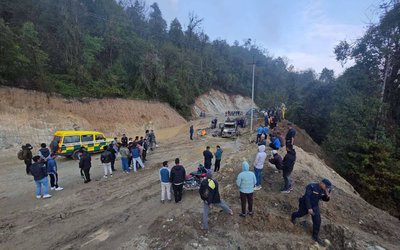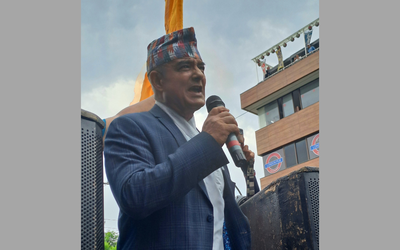
Novichok, a Soviet-era chemical weapon, was used to poison former Russian spy Sergei Skripal in the United Kingdom.
Tests performed on samples taken from prominent Russian opposition figure Alexey Navalny showed the presence of the Soviet-era nerve agent Novichok, the German government said.
Chancellor Angela Merkel's spokesman, Steffen Seibert, said in a statement on Wednesday testing by a special German military laboratory had shown "proof without doubt of a chemical nerve agent from the Novichok group".
"It is a dismaying event that Alexey Navalny was the victim of an attack with a chemical nerve agent in Russia," Seibert said. "The German government condemns this attack in the strongest terms. The Russian government is urgently requested to provide clarifications over the incident."
Russian presidential spokesman Dmitry Peskov said Russia was not informed of the German findings and had no such data, the TASS news agency reported.
But the German chancellor did not mince words.
"This is disturbing information about the attempted murder through poisoning against a leading Russian opposition figure," Merkel told a news conference. "Alexey Navalny was the victim of an attack with a chemical nerve agent of the Novichok group."
German Foreign Minister Heiko Maas urged Moscow to investigate the poisoning, and said the Russian ambassador had been summoned to explain the evidence.
"This makes it all the more urgent that those responsible in Russia be identified and held accountable," Maas told reporters. "We condemn this attack in the strongest terms."
Novichok - a military grade nerve agent - was used to poison former Russian spy Sergei Skripal and his daughter in the United Kingdom.
The Charite hospital in Berlin, where Navalny is being treated, has reported "some improvement" in his condition, but he remains in a medically induced coma and on a ventilator.
'Joint response'
German hospital: Clinical findings point to Navalny's poisoning (4:07)
Navalny, 44, a politician and corruption investigator who is one of Russian President Vladimir Putin's fiercest critics, fell ill on a flight back to Moscow from Siberia on August 20 and was taken to a hospital in the Siberian city of Omsk after the plane made an emergency landing.
He was later transferred to Charite hospital, where doctors last week said there were indications he had been poisoned.
Seibert said the German government would inform its partners in the European Union and NATO about the Novichok test results. He said it would consult with its partners in light of the Russian response "on an appropriate joint response".
Navalny's allies in Russia have insisted he was deliberately poisoned by the country's authorities, accusations the Kremlin rejected as "empty noise".
"To poison Navalny with Novichok in 2020 would be exactly the same as leaving an autograph at a crime scene, like this one," Navalny's longtime ally and strategist Leonid Volkov said in a tweet that featured a photo of Putin's name and a signature next to it.
Source: Aljazeera
- Iran, US to continue talks for nuclear deal
- Apr 20, 2025
- Putin announces Easter ceasefire in Ukraine
- Apr 20, 2025
- ICIMOD Says Hindu Kush Himalaya (HKH) Faces Lowest Rainfall In Third Conseqquetive Year
- Apr 19, 2025
- Tatopani Border Point Will Be Upgraded: Foreign Minister Dr. Deuba
- Apr 19, 2025
- Zelenskyy accuses China of supplying weapons to Russia
- Apr 19, 2025















